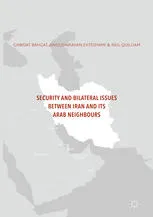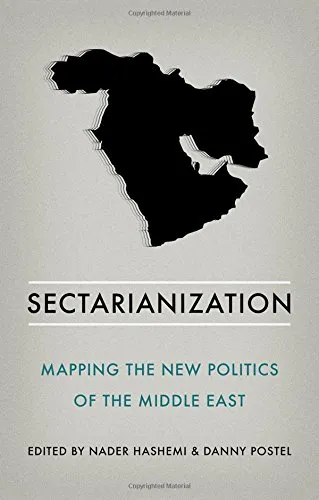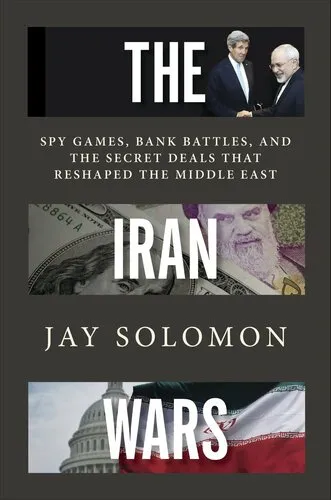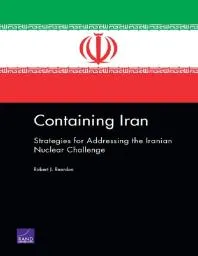Security and Bilateral Issues between Iran and its Arab Neighbours
4.5
بر اساس نظر کاربران

شما میتونید سوالاتتون در باره کتاب رو از هوش مصنوعیش بعد از ورود بپرسید
هر دانلود یا پرسش از هوش مصنوعی 2 امتیاز لازم دارد، برای بدست آوردن امتیاز رایگان، به صفحه ی راهنمای امتیازات سر بزنید و یک سری کار ارزشمند انجام بدینکتاب های مرتبط:
معرفی کتاب: امنیت و مسائل دوجانبه میان ایران و همسایگان عرب آن
کتاب «امنیت و مسائل دوجانبه میان ایران و همسایگان عرب آن» اثری بیبدیل است که به بررسی تعاملات پیچیده و گاه پرتنش میان جمهوری اسلامی ایران و کشورهای عرب حاشیه خلیجفارس میپردازد. بهویژه در دورانی که مسائل امنیت منطقهای، تأثیرات دیپلماسی انرژی و رقابتهای ژئوپلیتیکی بهشدت افزایش یافته، این کتاب مرجعی ارزشمند برای درک روابط متقابل و موانع موجود میان این کشورها محسوب میشود.
خلاصهای جامع از محتوای کتاب
این کتاب مجموعهای از مقالات پژوهشگران برجسته حوزه روابط بینالملل را گردآوری کرده است که روابط دوجانبه ایران و همسایگان عرب آن را از زوایای امنیتی، اقتصادی و سیاسی کاوش میکند. نویسندگان تلاش دارند پیچیدگیهای این روابط را در بستری تاریخی، اجتماعی و فرهنگی مطرح سازند و تأثیر تحولات منطقهای و جهانی بر این روابط را تحلیل نمایند. در بخشهایی از این کتاب، به تأثیرات گسترده رقابتهای ایران و عربستان سعودی، نقش کشورهای ثالث نظیر آمریکا و اسرائیل، و همچنین امنیت دریایی و دیپلماسی انرژی پرداخته میشود.
مجموعه مقالات همچنین به واکاوی روابط میان ایران و کشورهای عضو شورای همکاری خلیجفارس (GCC) همچون قطر، عمان، کویت، و امارات متحده عربی پرداخته و ضمن تشریح نقاط اشتراک، به تضادهای عمده و چالشهای ساختاری در این زمینه توجه دارد.
نکات کلیدی کتاب
- تحلیل جامع سیاست خارجی ایران و کشورهای عرب منطقه خلیجفارس.
- بررسی تأثیر رقابتهای ژئوپلیتیکی و ایدئولوژیکی میان ایران و عربستان سعودی.
- بررسی مسائل امنیتی دریایی در خلیجفارس و ابعاد دیپلماسی انرژی.
- نقش قدرتهای فرامنطقهای نظیر ایالات متحده و تأثیر آن بر روابط ایران و کشورهای عربی.
- ارائه دیدگاههای چندجانبه از سوی نویسندگان برجسته و تحلیلهای بیطرفانه.
جملات برجسته از کتاب
"تعاملات ایران و همسایگان عربی آن، آینهای از رقابتهای ژئوپلیتیکی گستردهتر در خاورمیانه است که بازیگران داخلی و خارجی را درگیر کشاکشی دائمی میکند."
"امنیت انرژی خلیجفارس نه تنها برای بازیگران منطقهای بلکه برای اقتصاد جهانی همچنان حیاتی است. وقوع هرگونه بحران در این منطقه، عواقب گستردهای به دنبال خواهد داشت."
چرا این کتاب مهم است؟
کتاب «امنیت و مسائل دوجانبه میان ایران و همسایگان عرب آن» نه تنها برای پژوهشگران علم سیاست و روابط بینالملل، بلکه برای تمامی افرادی که علاقهمند به درک بهتر روابط منطقه خاورمیانه و خلیجفارس هستند، از اهمیت بالایی برخوردار است. این کتاب ابزاری ارزشمند برای سیاستگذاران، تحلیلگران سیاسی و فعالان حوزه انرژی است که تلاش دارند تحولات منطقهای را درک کنند و راهبردهایی مناسب برای تعامل و مدیریت تنشها ارائه دهند.
علاوه بر این، این کتاب کمک میکند تا روابط ایران و کشورهای عربی، فراتر از کلیشههای رایج بررسی شود و عواملی چون تاریخ مشترک، مسائل فرهنگی و دینی، و تأثیرات اقتصادی مورد توجه قرار گیرد. این ویژگیها کتاب را به منبعی جامع و چندجانبه برای تحلیل عمیقتر این روابط تبدیل کرده است.
Introduction to Security and Bilateral Issues between Iran and its Arab Neighbours
The Middle East has long been a region of strategic importance, defined by its geopolitical complexities, resource wealth, and cultural richness. Standing at the forefront of this dynamic is the intricate relationship between Iran and its Arab neighbours. Security and Bilateral Issues between Iran and its Arab Neighbours, edited by Anoushiravan Ehteshami, Neil Quilliam, and Gawdat Bahgat, dives deep into the nuanced geopolitical, economic, and sociocultural factors shaping relations in this tumultuous region. This book provides a comprehensive exploration of the security dilemmas, policy challenges, and evolving bilateral ties that define the interactions between Iran and countries such as Saudi Arabia, the UAE, Bahrain, Iraq, and others.
By leveraging an interdisciplinary lens, the book captures both the historical antecedents and the contemporary dynamics driving regional developments. It lays bare the layers of trust and mistrust, cooperation and contention, and offers an essential resource for academics, diplomats, and policymakers seeking to navigate the volatile landscape of the Middle East.
Detailed Summary of the Book
This book brings together contributions from renowned experts and analysts to dissect the multilayered relationship between Iran and its Arab neighbours. The text examines historical and ideological dimensions while placing a strong emphasis on security and economic interdependence. Key topics explored include:
- The roots of mistrust, stemming from historical divisions like Sunni-Shia sectarianism and the Iranian Revolution of 1979.
- The role of regional power structures, including Iran’s nuclear ambitions and Saudi-led counter-influences.
- Bilateral relations and their variability, framed by political, economic, and strategic calculations across countries such as Qatar, the UAE, and Oman.
- Analysis of policy responses to regional crises, such as the Yemen conflict and the Syrian Civil War, where Iran and its Arab neighbours have been on opposing ends of the spectrum.
This granular examination of relationships draws attention to both the challenges ahead and potential avenues for reconciliation or collaboration, demonstrating that security imperatives and mutual interests, like trade and counterterrorism, could serve as stepping stones for future stability.
Key Takeaways
The book provides a treasure trove of insights that are indispensable for understanding the current and future trajectory of Middle East politics. Some major takeaways include:
- Iran’s central role in defying and challenging traditional power balances in the Gulf region, creating both opportunities and fears among its Arab neighbours.
- The importance of understanding bilateral ties within the broader context of external actors like the United States, Russia, and China, whose policies impact regional dynamics.
- How shifting global energy markets and economic diversification strategies are restructuring Gulf economies, presenting both conflict and cooperation potential between Iran and Arab states.
- The prospect of diplomacy overcoming ideological divides, contingent upon mutual concessions and shared strategic goals, such as reducing the influence of terrorism and extremism in the region.
Readers will come away with not only a deeper understanding of the historical divides in this region but also practical frameworks to analyze its future evolution.
Famous Quotes from the Book
The book is replete with thought-provoking and deeply analytical reflections. Here are some standout excerpts:
"Security in the Gulf is not merely a local or regional endeavor; it is woven into the fabric of global stability."
"The challenge is not in recognizing Iran's aspirations for influence, but in determining how its Arab neighbours respond—through confrontation or cooperation."
"Energy interdependence has the potential to transform rivalries into partnerships, but only if political will exceeds entrenched mistrust."
Why This Book Matters
The importance of Security and Bilateral Issues between Iran and its Arab Neighbours cannot be overstated, as it tackles one of the most pivotal and volatile relationships in the contemporary world order. With the Middle East at the nexus of global energy, trade, and security calculations, understanding the region’s evolving dynamics is crucial for policymakers, academics, and international observers alike.
This book not only deciphers the complexities of Iran-Arab relations but also presents forward-looking strategies that emphasize diplomacy, dialogue, and economic interdependence as keys to regional stability. In an era marked by uncertainty and mistrust, especially with emerging threats like cyber warfare and economic competition, this book serves as a north star for fostering cooperation and reducing tensions in one of the world’s most strategically significant regions.
Conclusion
If you are looking to sharpen your understanding of Middle Eastern geopolitics, power structures, and security challenges, Security and Bilateral Issues between Iran and its Arab Neighbours is an essential read. Its incisive analysis and balanced perspectives make it a vital contribution to the ongoing discourse surrounding Iran and the Gulf Arab states, offering insights not only on past and present dynamics but also recommendations for a more cooperative future.
دانلود رایگان مستقیم
شما میتونید سوالاتتون در باره کتاب رو از هوش مصنوعیش بعد از ورود بپرسید
دسترسی به کتابها از طریق پلتفرمهای قانونی و کتابخانههای عمومی نه تنها از حقوق نویسندگان و ناشران حمایت میکند، بلکه به پایداری فرهنگ کتابخوانی نیز کمک میرساند. پیش از دانلود، لحظهای به بررسی این گزینهها فکر کنید.
این کتاب رو در پلتفرم های دیگه ببینید
WorldCat به شما کمک میکنه تا کتاب ها رو در کتابخانه های سراسر دنیا پیدا کنید
امتیازها، نظرات تخصصی و صحبت ها درباره کتاب را در Goodreads ببینید
کتابهای کمیاب یا دست دوم را در AbeBooks پیدا کنید و بخرید
1490
بازدید4.5
امتیاز0
نظر98%
رضایتنظرات:
4.5
بر اساس 0 نظر کاربران
Questions & Answers
Ask questions about this book or help others by answering
No questions yet. Be the first to ask!















